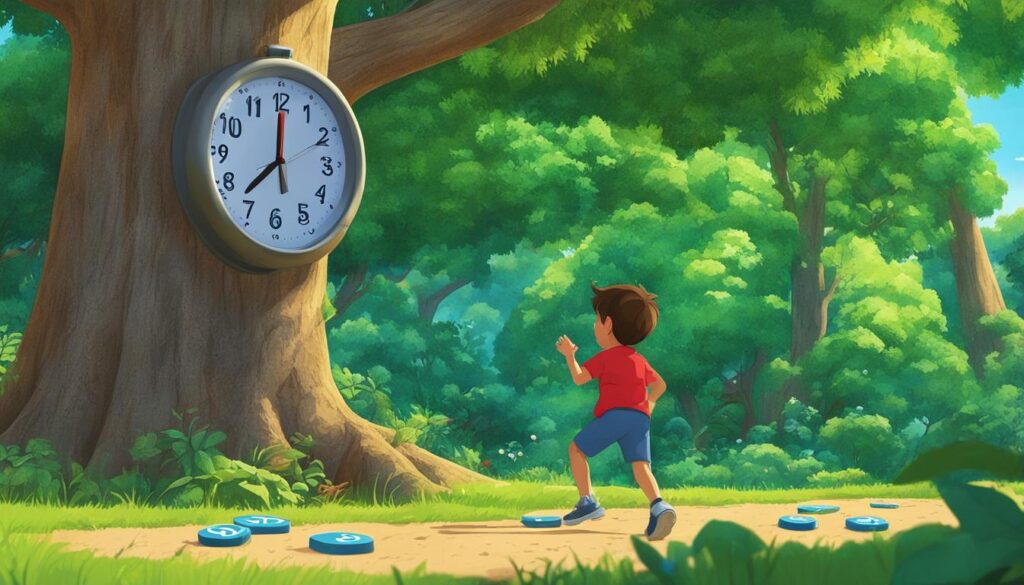Child development is a crucial aspect of parenting, and as a parent, I understand the importance of supporting my child’s growth and potential. It’s fascinating to witness the incredible changes that occur as they navigate their way through various stages of development.
In this article, I will explore the secrets to enhancing your child’s mental development across multiple domains: cognitive, social-emotional, language, and physical development. By implementing these strategies, you can play an active role in unlocking your child’s full potential and laying the foundation for their future success.
Key Takeaways:
- Understanding the different aspects of child development is crucial for parents.
- Enhancing cognitive development can be achieved through curiosity, problem-solving, and limit screen time.
- Social-emotional development is nurtured through social interaction and fostering creativity.
- Language development can be enhanced through reading aloud and communicating effectively.
- Physical development is supported by providing a balanced diet and encouraging physical activity.
Strategies to Enhance Child Development
To enhance your child’s mental development, there are several strategies that you can implement. By incorporating these techniques into your parenting approach, you can unlock your child’s full potential and support their growth in various domains.
Cultivate Curiosity and Exploration
Encouraging curiosity and exploration is essential for fostering your child’s cognitive development. Create a stimulating environment that sparks their interest and curiosity. Provide open-ended toys and materials that allow them to explore and discover new things. Encourage sensory play, such as sand or water play, to engage their senses and promote cognitive stimulation. This hands-on approach to learning not only boosts their cognitive abilities but also nurtures their creativity.
Reading Aloud: A Pathway to Language Development
Reading aloud to your child regularly offers numerous benefits for their language development. It exposes them to a wide range of vocabulary, improves their listening skills, and enhances their imagination. Choose age-appropriate books with engaging stories and vibrant illustrations to captivate their attention. As you read, involve them in the storytelling process by asking questions, encouraging predictions, and discussing the characters and plot. This interactive reading experience strengthens their language skills and builds a strong foundation for future academic success.
Problem-Solving: Developing Analytical Thinking
Promote problem-solving skills in your child by integrating puzzles, games, and other activities that require critical thinking. Encourage them to solve riddles, complete puzzles, or engage in age-appropriate brain-teasers. These activities stimulate their analytical thinking and nurture their problem-solving abilities. As they encounter challenges, provide guidance and support while allowing them to develop their own strategies. This fosters their creativity, resilience, and the ability to think outside the box.
Limit Screen Time: Balancing Digital and Real-World Experiences
In today’s digital age, it’s crucial to strike a balance between screen time and other activities that promote social skills, creativity, and sensory stimulation. Excessive screen time can hamper the development of essential cognitive and social-emotional skills in children. Set reasonable limits on electronic device usage, ensuring that your child engages in alternative activities. Encourage outdoor play, engage in pretend play, promote face-to-face interactions, and provide opportunities for hands-on exploration. This helps your child develop vital social skills and maintain a healthy balance between the digital world and the real world.

Implementing these strategies, such as nurturing curiosity and exploration, incorporating reading aloud, promoting problem-solving, and limiting screen time, can greatly enhance your child’s mental development. By providing the right environment and experiences, you lay the foundation for their cognitive growth, creativity, and overall well-being.
Importance of a Balanced Diet and Physical Activity
A balanced diet and regular physical activity are essential for the optimal development of your child’s mind. Providing a well-rounded diet that includes essential nutrients, vitamins, and minerals is crucial for the growth of their brain. Incorporating fruits, vegetables, whole grains, and lean proteins into their meals ensures they receive the necessary fuel for their mental development.
Encouraging your child to engage in physical activities also plays a significant role in their mental well-being. Regular exercise promotes concentration, cognitive abilities, and overall mental health. Whether it’s running, swimming, dancing, or participating in team sports, physical activity stimulates their brain and supports their cognitive development.
A balanced diet and physical activity work hand in hand to create a healthy foundation for your child’s mind. When combined, they provide the nutrients and stimulation necessary for optimal cognitive function and mental well-being.
The Benefits
A balanced diet and physical activity offer numerous benefits for your child’s mind and body. Here are some key advantages:
- Promotes mental well-being
- Enhances concentration and focus
- Improves cognitive abilities
- Boosts mood and overall mental health
- Supports brain development
- Reduces the risk of chronic diseases
Expert Insight
“A balanced diet and regular physical activity are two vital pillars that contribute to a child’s optimal mental development. The nutrients obtained from a wholesome diet provide the building blocks for their brain, while physical activity stimulates cognitive functions. By prioritizing both, parents can support their child’s holistic growth and set them up for future success.”
– Dr. Jillian Martinez, Child Development Specialist
Nurturing Creativity and Social Interaction
Fostering creativity is crucial for the development of the mind. It allows children to explore their interests, expand their imagination, and develop problem-solving skills. Encouraging creative activities provides an outlet for self-expression and cultivates a sense of innovation and curiosity.

One way to nurture your child’s creativity is by encouraging them to engage in various artistic pursuits, such as drawing, painting, writing, or playing a musical instrument. These activities stimulate their imagination, allowing them to express themselves in unique and imaginative ways. It also assists in the development of fine motor skills and hand-eye coordination.
Another important aspect of child development is social interaction. Engaging in social activities helps children develop vital communication and social skills. By encouraging peer interactions and group activities, you create opportunities for your child to learn how to collaborate, negotiate, and resolve conflicts.
“Creativity is contagious. Pass it on.”
To enhance social interaction, consider enrolling your child in group activities such as team sports, art classes, or community clubs. These experiences provide opportunities for socializing with peers who share similar interests, fostering cooperation and teamwork skills.
Communication skills are also vital for effective social interaction. Encourage your child to engage in conversations, actively listen, and express their thoughts and feelings. By providing a safe and supportive environment for communication, you help them develop crucial skills necessary for building relationships and establishing connections with others.
Overall, nurturing creativity and social interaction plays a significant role in facilitating holistic child development. By encouraging creative activities and promoting social engagement, you empower your child to explore their potential, develop essential skills, and build meaningful connections with others.
Conclusion
Parenting is a rewarding yet challenging journey, filled with ups and downs. As parents, we play a crucial role in our child’s development, nurturing their growth and unlocking their full potential. Understanding the various aspects of child development is essential for successfully navigating this complex journey.
By implementing strategies to enhance your child’s cognitive, social-emotional, language, and physical development, you pave the way for their success in the future. Encouraging curiosity and problem-solving skills, fostering creativity, and promoting social interaction are just a few ways to support your child’s overall growth.
Remember that parenting is a continuous learning process. It’s okay to seek support when needed, whether from trusted friends, family members, or professionals. Embrace the joys and challenges of parenting, for they create a bond and legacy that lasts a lifetime. Every milestone, every obstacle overcome, brings us closer to the ultimate reward of seeing our children thrive.
FAQ
What is child development?
Child development refers to the biological, psychological, and emotional changes that occur as children grow and mature. It encompasses various domains, including cognitive development (thinking and learning), social-emotional development (forming relationships and managing emotions), language development (communication skills), and physical development (motor skills and coordination).
What are developmental milestones?
Developmental milestones are tasks or skills that most children can perform at specific ages. They serve as benchmarks to track a child’s progress in different areas of development. Examples of developmental milestones include crawling, walking, talking, and social interaction.
How does early childhood development affect a child’s future?
Early childhood development lays the foundation for a child’s future success. Stimulating a child’s mind and providing opportunities for growth during early years can have long-lasting effects on their cognitive, social-emotional, and physical well-being. Investing in their development early on can lead to better academic achievement, healthier relationships, and improved overall quality of life in adulthood.
What role does brain development play in child development?
Brain development is a crucial aspect of child development. During early childhood, the brain undergoes rapid growth and wiring, forming connections that shape a child’s cognitive abilities, emotional regulation, and social skills. The quality of experiences, interactions, and environments play a significant role in shaping healthy brain development in children.
What are the key stages of child development?
Child development can be divided into several stages, including infancy (0-2 years), early childhood (2-6 years), middle childhood (6-11 years), and adolescence (11-18 years). Each stage is characterized by specific developmental milestones and changes in physical, cognitive, social-emotional, and language abilities.
How can parents support their child’s cognitive development?
Parents can support their child’s cognitive development by providing a stimulating environment that encourages curiosity and exploration. Engaging in activities such as reading aloud, puzzles, and problem-solving games can also foster critical thinking, creativity, and language skills.
What is social-emotional development, and how can parents promote it?
Social-emotional development refers to a child’s ability to form relationships, manage emotions, and navigate social interactions. Parents can promote social-emotional development by providing a loving and supportive environment, teaching empathy and emotional regulation, and encouraging positive peer interactions.
How does language development impact a child’s overall development?
Language development is crucial for communication, cognitive growth, and social interaction. Parents can support language development by talking, singing, and reading to their child regularly. Responding to their babbling, encouraging speech, and exposing them to a rich vocabulary can also enhance their language skills.
Why is physical development important for a child?
Physical development is essential for a child’s overall growth and well-being. It includes the development of gross motor skills (such as crawling, walking, and running) and fine motor skills (such as holding a pen or buttoning a shirt). Regular physical activity promotes healthy growth, strengthens muscles and bones, and fosters coordination and balance.
How can parents foster creativity in their child?
Parents can foster creativity in their child by providing opportunities for artistic expression, such as drawing, painting, and playing musical instruments. Encouraging imaginative play and offering open-ended materials and activities can also stimulate their creative thinking and problem-solving skills.
Why is social interaction important for a child’s development?
Social interaction is vital for a child’s development as it helps them learn social skills, develop language abilities, and understand different perspectives. Engaging in peer interactions, group activities, and community involvement promotes social-emotional growth, empathy, and communication skills.

